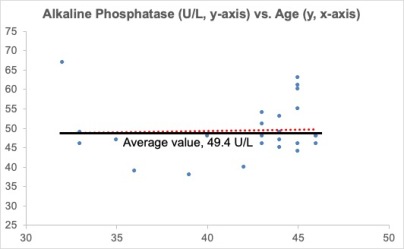Alkaline phosphatase (ALP) is one of the 10 variables used to quantify biological age with PhenoAge (https://michaellustgarten.wordpress.com/2019/09/09/quantifying-biological-age). The reference range for alkaline phosphatase is 20 – 140 IU/L*, but within that range, what’s optimal?
Two separate meta-analyses have investigated the association between serum levels of ALP with risk of death for all causes. First, in a meta-analysis of 4 studies that included ~9 million adults, ALP values greater than 48 IU/L were associated with a significantly increased all-cause mortality risk (Kunutsor et al. 2014):

In another meta-analysis that included 24 studies and 147,634 subjects (Li et al. 2014), lowest risk of death for all causes was identified for ALP values ~50 IU/L:

Note that mortality risk increased linearly up to 85 U/L (short dashed line, dark black line), but increased at a much greater rate for values greater than 85 U/L. In addition, the meta-analysis of Li et al. 2014 did not include the 8.9 million adults of Fulks et al. (2008), which were included in the Kunutsor meta-analysis. Nonetheless, the data from these 2 complimentary meta-analyses arrive at the same conclusion: lower ALP values may be better in terms of reducing risk of death from all causes.
Investigating further, ALP levels increase during aging from ~60-80 U/L in adults < 55y to > 80 U/L in adults > 55y (Strømme et al. 2005, Han et al. 2016), evidence that further suggests that lower may be better:

What are my ALP values? As shown below, I’ve measured ALP 27 times over the past 13 years, with an average value of 49.4 U/L (black line). Also note the red dotted trend line, which is close to flat over that period. So far, so good for ALP!

*Note that IU/L = U/L
If you’re interested, please have a look at my book!
References
Fulks M, Stout RL, Dolan VF. Using liver enzymes as screening tests to predict mortality risk. J Insur Med 2008;40:191–203.
Han L, Wang J, Zhang Q, Ke P, Wu X, Wan Z, Lin H, Zeng R, Huang X, Zhuang J. Development of reference intervals for serum alkaline phosphatase among adults in Southern China traced to the new IFCC reference measurement procedure. Clin Chem Lab Med. 2016 Apr;54(4):659-65. doi: 10.1515/cclm-2015-0732.
Kunutsor SK, Apekey TA, Seddoh D, Walley J. Liver enzymes and risk of all-cause mortality in general populations: a systematic review and meta-analysis. Int J Epidemiol. 2014 Feb;43(1):187-201.
Li JW, Xu C, Fan Y, Wang Y, Xiao YB. Can serum levels of alkaline phosphatase and phosphate predict cardiovascular diseases and total mortality in individuals with preserved renal function? A systemic review and meta-analysis. PLoS One. 2014 Jul 17;9(7):e102276.
Strømme JH, Rustad P, Steensland H, Theodorsen L, Urdal P. Reference intervals for eight enzymes in blood of adult females and males measured in accordance with the International Federation of Clinical Chemistry reference system at 37 degrees C: part of the Nordic Reference Interval Project. Scand J Clin Lab Invest. 2004;64(4):371-84. Erratum in: Scand J Clin Lab Invest. 2005;65(1):83-4.

What concrete actions can be taken to improve the alkaline phosphatase level?
LikeLike
Great question. The correlation between my diet with ALP isn’t as strong as for other biomarkers (i.e. see my albumin article). For ex., the combination of Vitamin E and folate are positively associated with ALP, so I may need to watch my dietary intake of these nutrients to keep my ALP ~50. However, the combined R2 for these 2 nutrients is ~0.50, so there’s definitely more to the story.
Interestingly, the strongest correlation is with CRP (r=0.81), but I only have 4 measurements for that. I’m going to test in a couple of weeks, so more data should help to clarify this!
LikeLike
Have you considered that ALP isn’t itself a bad marker that needs to be kept low, and that the meta analysis indicating higher mortality may be due to ALP being higher due to underlying conditions? Similar to higher cholesterol levels, the cholesterol in itself isn’t harmful, but it’s the damaging inflammation that recruits cholesterol to patch the arteries. Kind of like blaming the firemen that show up to put out the fire. This article is interesting food for thought with references. I found the intestinal ALP effects very interesting, especially in reducing LPS which causes chronic inflammation. So many people have gut dysbiosis and chronic inflammation, this could be helpful.
https://labs.selfdecode.com/blog/alkaline-phosphatase-normal/
LikeLike
If you have published evidence that relatively high ALP levels are good for health, please post it…
LikeLike
I am 74yr and my A Phosphates # is 980? What would you recommend.
LikeLike
Follow up testing, as soon as possible.
LikeLike